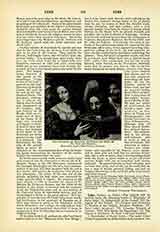

Lucius II, POPE (GHERARDO CACCIANEMICI DAL ORSO), b. at Bologna, unknown date, d. at Rome, February 15, 1145. Before entering the Roman Curia he was a canon regular in Bologna. In 1124 Honorius II created him Cardinal–Priest of Santa Croce in Gerusalemme. From 1125-1126 he was papal legate in Germany where he took part in the election of King Lothair III in 1125, was instrumental in the appointment of St. Norbert as Bishop of Magdeburg in July, 1126, and helped settle the quarrel concerning the filling of the See of Würzburg, after Bishop Gebhard had been deposed by papal authority in 1126. During the pontificate of Innocent II (1130-43) we find him three times as legate in Germany, viz., in the years 1130-1, 1133-4, and 1136. In all these legations he loyally supported the interests of Innocent II, and it must be ascribed chiefly to his exertions that Lothair III made two expeditions to Italy for the purpose of protecting Innocent II against the antipope, Anacletus II. Towards the end of the pontificate of Innocent II he was appointed papal chancellor and librarian. He was elected and consecrated pope at Rome on March 12, 1144, to succeed Celestine II who had reigned only five months and twelve days.
The new pope took the name of Lucius II; shortly after his accession he had a conference with King Roger of Sicily at Ceperano early in June, 1144, for the purpose of reaching an understanding with the king regarding his duties as a vassal of the Apostolic See. Roger‘s demands, however, were so extravagant that Lucius on the advice of his cardinals rejected them. The king now had recourse to arms and Lucius was forced to conclude a truce on terms that were dictated by Roger. In Rome affairs were even less promising. Lucius, indeed, had succeeded in dissolving the senate which had been reluctantly established by Innocent II and which had practically wrested the temporal power from the pope, but encouraged by the success of King Roger of Sicily, the republican faction now elected Pierleoni, a brother of the antipope Anacletus, as senator and demanded that the pope should relinquish all temporal matters into his hands. After vainly calling upon Emperor Conrad for protection, Lucius II marched upon the Capitol at the head of a small army but suffered defeat. If we may believe the statement of Godfrey of Viterbo in his “Pantheon” (Muratori, “Script rer. Ital.”, VII, 461; and P.L., CXCVIII, 988) Lucius II was severely injured by stones that were thrown upon him on this occasion and died a few days later. At a synod held in Rome during May, 1144, he settled the prolonged dispute between the Metropolitan of Tours and the Bishop of Dol by making the latter suffragan of the former. He requested Abbot Peter of Cluny to send thirteen of his monks to Rome and upon their arrival gave them the monastery of St. Sabas on the Aventine on January 19, 1145. He founded a few other monasteries in Italy and Germany and was especially well disposed towards the recently instituted Order of the Premonstratensians. His epistles and privileges are printed in P.L., CLXXIX, 823-936.
MICHAEL ORR

